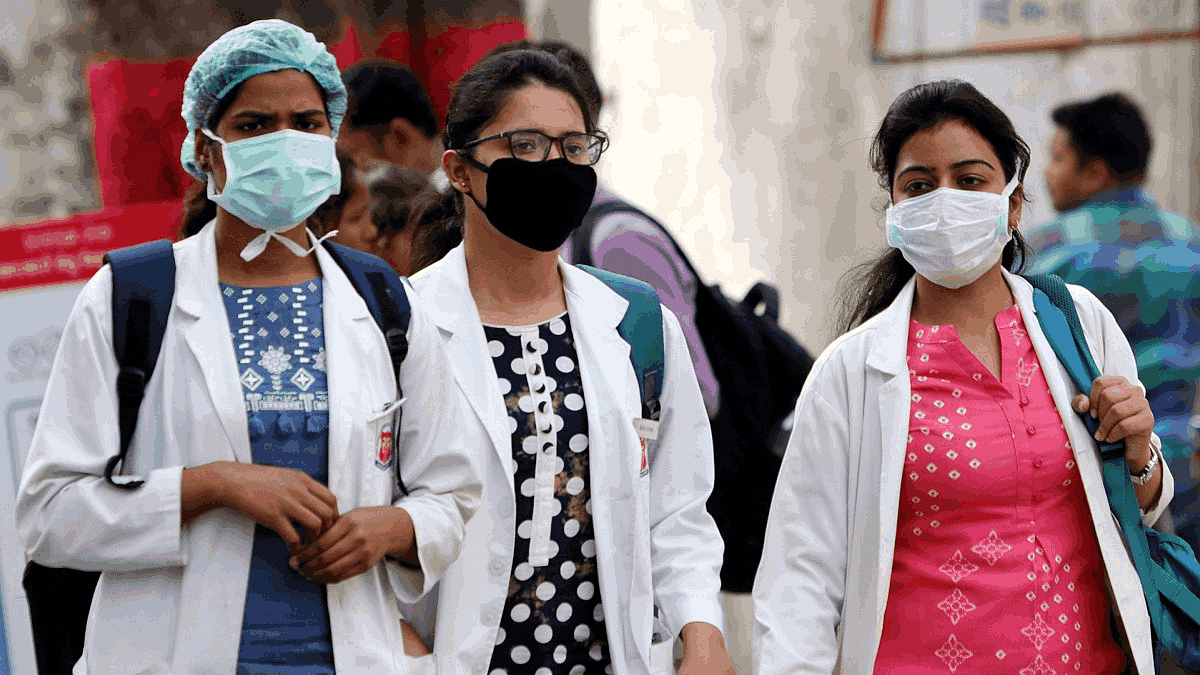New Delhi: A total of 1,445 post-graduate (PG) seats still lying vacant in medical colleges across India after three rounds of counselling has prompted the central government to set up a committee to review the reasons behind students not showing interest in admission to the leftover broad speciality seats, ThePrint has learnt.
These seats are lying vacant despite the health ministry, via a circular on 20 September, allowing all candidates who sat for the National Eligibility-cum-Entrance Test (PG), 2023, to take admission in seats still available in the Doctor of Medicine (MD), Master of Surgery (MS) and Diplomate of National Board (DNB) courses after two rounds of counselling.
In other words, for the first time, the qualifying percentile for NEET-PG admission to leftover PG seats was reduced to zero.
The data accessed by ThePrint shows that after the stray round of counselling (held after seats fall vacant after the regular two rounds) that concluded on 25 October, a total of 862 MS, MD and DNB seats are still vacant under the all-India quota, while 583 such seats are vacant under the state quota.
“In view of this, a panel has been set up under the Director General of Health Services to look at the reasons for vacant seats and suggest remedies for the same,” a senior official in the medical education division of the ministry told ThePrint.
The vacant seats, another official said, were mostly in non-clinical subjects such as anatomy, biochemistry, physiology, microbiology and pharmacology.
The second official added that the ministry is also considering a fourth round of counselling in order to allow students who may not have got the opportunity yet to choose a seat or may have missed out on admissions for some reason.
ThePrint reached Union Health Secretary Sudhansh Pant via calls for a comment. This report will be updated if and when a response is received.
Meanwhile, on PG seats going vacant year after year, Dr. Sharad Kumar Agarwal, national president of the Indian Medical Association (IMA), a network of doctors which supported the government move to reduce PG qualifying percentile to zero, said there was an urgent need to review the admission counselling process.
“As of now, the Centre and states conduct their own counselling and we get a sense that many interested students who want to opt for non-clinical subjects are unable to do so because of confusion in how the two systems work parallelly,” he said to ThePrint.
Also read: NMC to release new norms for PG medical students — limit on working hrs, strategies to reduce stress
Vacant seats & possible solutions
As of 2023, there are a total of 67,802 PG seats in medical colleges and hospitals. Of these, there are 30,211 MS/MD seats in government medical colleges and 19,362 MS/MD seats in private medical colleges, while the rest, 18,229, are DNB seats, according to the data ThePrint has accessed.
DNB seats, regulated by the National Board of Examinations under the ministry, are considered equivalent to MS/MD regulated by the National Medical Commission, and are mostly offered by large private hospitals, barring some that are also there in district hospitals run by the government.
According to the NEET PG norms, all seats in central institutions — such as the All India Institute of Medical Sciences (AIIMS), and deemed universities — and 15 percent in medical colleges, run by states, trusts or privately, are filled through an all-India quota. States have the rest of the medical college seats in their quota.
The details accessed by ThePrint show that under the state quota, the highest number of seats, 226, were vacant in Andhra Pradesh, followed by Uttar Pradesh at 108 and Tamil Nadu at 80.
Dr Agarwal has a solution to offer. “My advice would be that the counselling for admission under both quotas be merged through a common platform and software. It will help students make choices with greater clarity,” he said. He also suggested that institutes be allowed to take admission at their own level with certain checks and balances so that there is no “selling of seats beyond the stipulated fee in private colleges”.
Meanwhile, Dr Aviral Mathur, president of the Federation of Resident Doctors Association (FORDA), pointed out that the leftover seats are likely to be mostly DNB seats. “Sometimes, candidates are not interested in taking up DNB seats in private hospitals in tier 2 or 3 cities because they do not offer good training opportunities,” he said.
Like IMA, FORDA had also supported the government’s decision to lower the qualifying NEET-PG percentile to fill up seats. “But,” Mathur added, “the fact that these seats are still lying vacant also debunks the argument that the government move (to bring down the percentile to 0) could lead to an unabated sale of PG seats.”
(Edited by Smriti Sinha)
Also read: Tech changing healthcare, need ‘uniform, progressive regulations’, FICCI report urges govt

